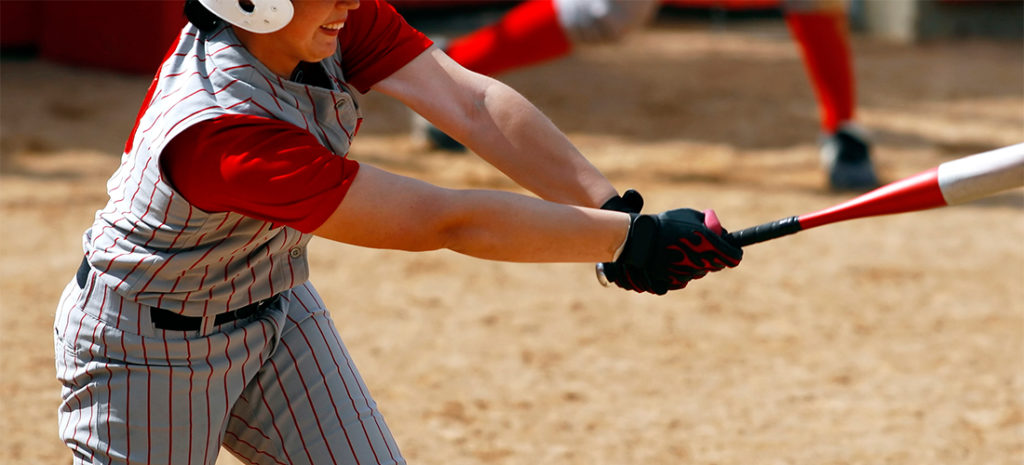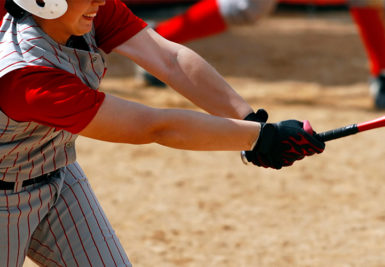THIS POST IS PART OF THE ULTIMATE GUIDE TO SPORTS MEDICINE
Spring is just around the corner, which means it’s time for baseball and softball players to start conditioning for the season. As athletes get in shape its common that injuries will occur. In baseball and softball, a shoulder injury can cripple the player’s performance. It’s important to know that there are quite a few different shoulder injuries to be aware of, as well as a variety of treatment options.
Shoulder injuries
Shoulder injuries in baseball players and softball players are similar for field players, but different for pitchers. The most common shoulder problem from overhead throwing, for pitchers in either sport, is rotator cuff tendinitis. This usually occurs as a result of overuse or poor throwing form.
“For baseball pitchers, there can be high stress on the superior labrum, a gasket-type structure, where biceps tendon attaches in the shoulder, resulting in a labrum tear,” said Dr. Jonathan Shook, sports medicine specialist at OrthoIndy. “This is termed a superior labrum anterior posterior tear, better known as SLAP tear.”
Additionally, Dr. Shook explained that rotator cuff tears are very common in baseball pitchers as well. They usually occur in the posterior rotator cuff, versus most others outside of baseball injuries that occur in the frontal area. Softball pitchers are more likely to have injuries in the biceps tendon as a result of the unique ‘windmill’ style of underhand pitching.
So why do these injuries occur?
“The most common reason for shoulder injuries is overuse,” said Dr. Shook. “I see many young athletes who are playing multiple games per week and practicing every day, even on the off-season. The lack of time off causes chronic fatigue and stress on the structures of the shoulder. Eventually something has to give.”
However, there is some good news. The majority of shoulder injuries can be handled without surgery. The first line of treatment is usually rest and physical therapy. According to Dr. Shook, if the player is having pain in his or her shoulder, then they need to stop playing. Furthermore, the player should be evaluated to determine if there is a flaw in their throwing form.
Along with physical therapy, the athlete may use non-steroidal anti-inflammatory medications (NSAIDs) such as ibuprofen or prescription medications to treat the pain. “Occasionally, we will use a cortisone injection to help reduce inflammation as well,” said Dr. Shook.
If the player is still experiencing pain, an orthopedic sport’s medicine specialist will usually obtain X-rays or, if necessary, an MRI. Those tests will help the physician determine the exact injury and treatment needed.
“If conservative treatment fails and the MRI indicates a tear of one or more of the structures of the shoulder, then surgery may be the best option,” said Dr. Shook. “This is usually done in an outpatient setting and can commonly be accomplished using an arthroscopic, minimally invasive technique.”
Rehabilitation of shoulder injuries in baseball and softball players can be a prolonged process depending on the type of injury. There is not a specific time frame for when an athlete will be able to return to the game.
“For an athlete that has shoulder or rotator cuff tendinitis, he or she might only miss a couple of weeks or months depending on the severity of the condition and response to treatment. For an athlete undergoing shoulder surgery, they are more likely to miss 6 to 12 months of competition.”
Pitch counting can also make a big difference in the prevention of shoulder injuries in young athletes. This limits Little League pitchers to a certain number of pitches they can throw a week. These principles can be applied to position players and softball players as well.
Prevention of shoulder injuries is not always possible, but there are certain things athletes can do to reduce the risk. According to Dr. Shook, weight training, stretching and understanding proper throwing techniques will benefit the player most. Additionally, it’s important for players to realize they shouldn’t play through the pain.
To schedule an appointment with Dr. Shook please call 317.569.2514. or learn more about shoulder treatment options at OrthoIndy.
Schedule an appointment
Your well-being is important to us. Click the button below or call us to schedule an appointment with one of our orthopedic specialists. If your injury or condition is recent, you can walk right into one of our OrthoIndy Urgent Care locations for immediate care. For rehabilitation and physical therapy, no referral is needed to see one of our physical therapists.





